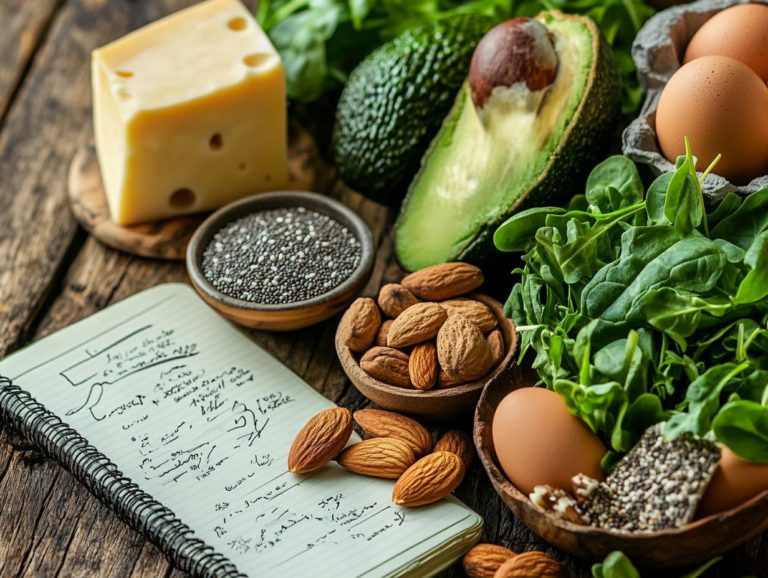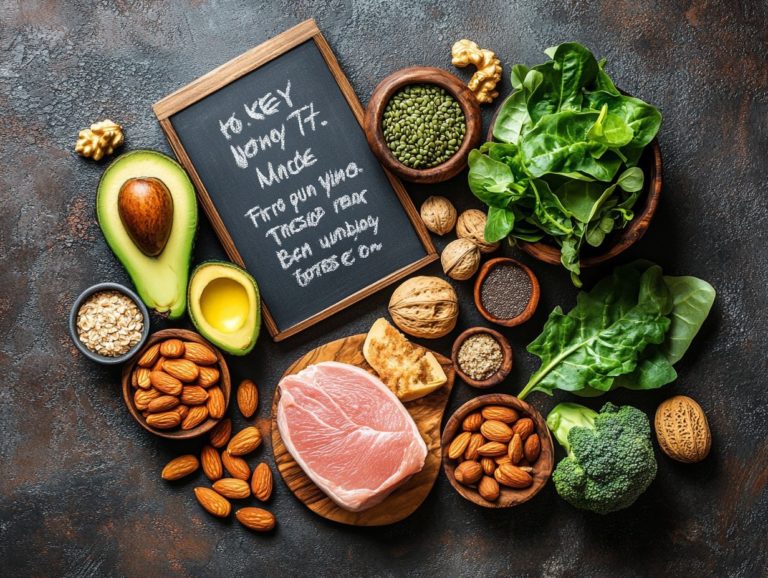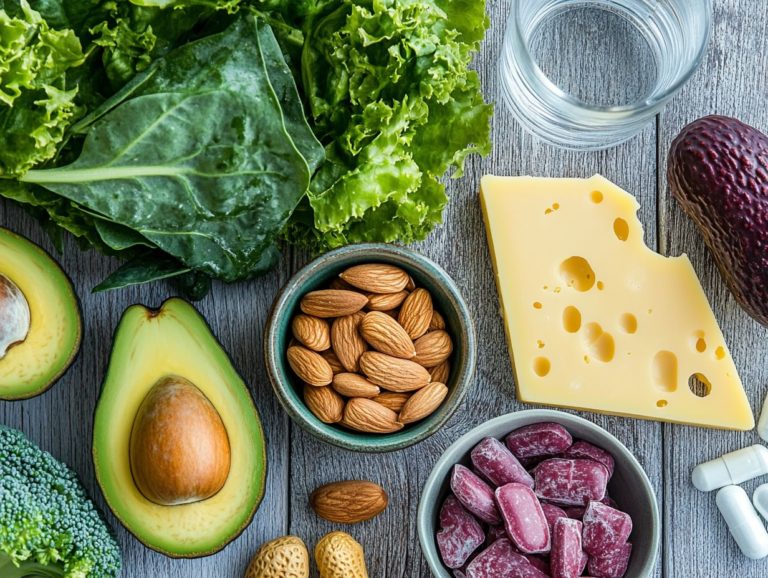Keto Diet: Nutritional Needs for Athletes
The ketogenic diet, celebrated for its low-carb, high-fat approach, has captured attention not only for effective weight loss but also among endurance athletes and those striving for peak performance.
So, how does this diet actually function, and can it genuinely cater to the distinct nutritional requirements of those who push their bodies to the limit through rigorous training regimens?
Let s explore the fundamentals of the ketogenic diet together, uncovering its potential benefits and risks for athletes while offering practical tips, including meal prep, to help you excel on this dietary journey.
Whether you re a seasoned competitor or just beginning your athletic path, grasping the essentials now could transform your performance in amazing ways, enhancing your energy levels and overall exercise performance.
Contents
- Key Takeaways:
- What is the Keto Diet?
- How Does the Keto Diet Work?
- What Are the Nutritional Needs of Athletes?
- How Can the Keto Diet Meet These Needs?
- Unlocking Athletic Potential: Benefits of the Keto Diet
- Understanding the Risks of the Keto Diet for Athletes
- What Are Some Tips for Athletes Following the Keto Diet?
- Your Keto Questions Answered!
- What is the Keto Diet and how does it differ for athletes, including triathletes?
- How does the Keto Diet affect athletic performance and racing strategies?
- What are the recommended macronutrient ratios for athletes following the Keto Diet, especially for those looking to enhance performance?
- What are some good sources of healthy fats and other essential nutrients for athletes on the Keto Diet?
- How can athletes ensure they are meeting their nutrient needs and maintaining proper hydration levels on the Keto Diet?
- Are there any potential risks, drawbacks, or dietary intervention considerations for athletes on the Keto Diet?
Key Takeaways:

- The Ketogenic Diet can provide adequate protein and calorie intake for athletes to meet their nutritional needs and support muscle gain.
- Benefits of the Keto Diet for athletes include improved body composition, enhanced performance, and increased endurance.
- Athletes following the Keto Diet should carefully plan meals, monitor electrolyte levels to avoid imbalances, and stay consistent and patient for optimal results.
What is the Keto Diet?
The ketogenic diet, often known as the keto diet, is a sophisticated nutritional strategy characterized by high-fat and low-carbohydrate intake. This approach aims to transform your body s primary energy source from carbohydrates to fats, enhancing fat oxidation and performance outcomes.
By significantly curtailing your carbohydrate consumption, you enable your body to enter a metabolic state known as ketosis. In this state, your body becomes remarkably efficient at utilizing fat for energy.
This unlocks a range of health benefits, such as effective weight loss, muscle gain, and enhanced athletic performance.
How Does the Keto Diet Work?
The keto diet operates by ushering your body into a state of ketosis. In this phase, with carbohydrates in short supply, your system turns to fat for energy. This significantly enhances fat oxidation (the process of burning fat for energy), metabolic flexibility (the body s ability to switch between fuel sources), and overall exercise efficiency.
This transition involves an adaptation period, during which your body recalibrates its metabolism to rely on ketones derived from fat as its main source of fuel. During this time, you might experience keto flu, a temporary phase with symptoms such as fatigue and electrolyte imbalances.
What Are the Nutritional Needs of Athletes?
As an athlete, particularly if you re an endurance athlete like a triathlete, your nutritional needs are distinct and essential for maximizing your performance, sustaining your energy levels, and enhancing your recovery time.
It s crucial to focus on several key factors: ensuring you consume enough protein to support muscle growth, accurately counting calories to meet your energy demands, and maintaining optimal hydration to ward off fatigue during those grueling training sessions and competitions. Consider your sodium intake to avoid imbalances that can affect performance.
How Can the Keto Diet Meet These Needs?
The ketogenic diet can serve as an exceptional strategy to meet your nutritional needs as an athlete, offering a distinctive approach to energy management, performance enhancement, and body composition. This dietary intervention helps in sustaining your energy levels during high-intensity training.
By emphasizing a high-fat, low-carbohydrate intake, you can optimize your nutrient consumption, maintain a steady energy supply during training, and elevate your performance outcomes through carefully crafted meal preparation that aligns with your dietary guidelines. Strategic coaching advice can further enhance these outcomes.
1. Adequate Protein Intake
Adequate protein intake is essential for you as an endurance athlete on the ketogenic diet. It promotes muscle gain, repairs tissues, and supports overall performance. This becomes particularly crucial as your body adapts to using fat as its primary energy source. It ensures that your muscle mass remains intact even during caloric restrictions. Supplements like MCT oil can also be beneficial for maintaining energy levels.
For those engaged in intensive training, a daily protein intake of 1.2 to 2.0 grams per kilogram of body weight is often recommended. This should be tailored to your specific goals and exercise intensity. Consider the potential benefits of supplements like magnesium and potassium to support overall health.
Prioritizing high-quality protein sources like lean meats, fish, eggs, and plant-based options such as legumes and nuts can significantly enhance your recovery and muscle maintenance.
Striking the right balance among proteins, healthy fats, and minimal carbohydrates is key to sustaining your energy levels without disrupting ketosis. This balance enables you to enjoy the benefits of both muscle preservation and fat adaptation, ultimately leading to improved performance. Monitoring your glycogen reserves can also offer insights into how well your body is adapting.
2. Sufficient Calorie Intake
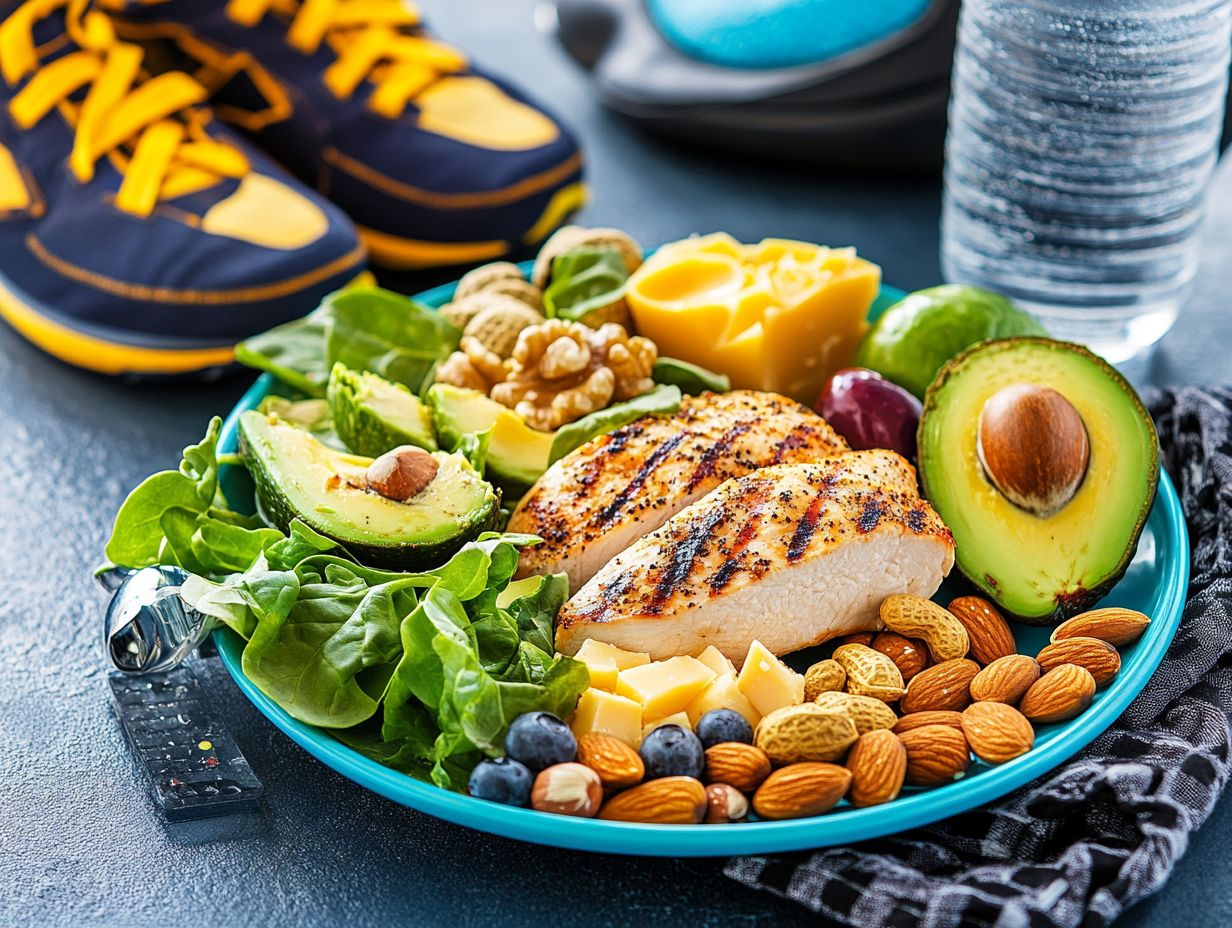
Maintaining a sufficient calorie intake is crucial for you as an endurance athlete following the ketogenic diet. It ensures that you have optimal energy levels and supports weight maintenance while steering clear of fatigue symptoms. Striking a careful balance in your caloric consumption is necessary to fuel your intense training regimens and facilitate recovery without compromising your state of ketosis.
To effectively manage your caloric intake, it’s essential to comprehend your unique metabolic demands. These can fluctuate based on the intensity and duration of your training. Tracking your calorie consumption becomes paramount; it allows you to make adjustments tailored to the specific energy you require for your endurance sessions.
Utilizing apps or food diaries can be a game-changer. They help you monitor your nutrient intake to ensure you re not only consuming enough calories but also achieving the right balance of fats, proteins, and minimal carbs.
Understanding how different foods impact your energy levels and recovery can assist you in fine-tuning your dietary choices. This supports both your performance and adherence to keto principles.
3. Proper Hydration
Stay hydrated! It s essential for boosting your performance and recovery. Proper hydration directly affects how well you perform. Maintaining optimal hydration levels helps prevent electrolyte imbalances and supports your sodium intake.
Dehydration can result in heightened fatigue and impede your exercise performance. It s critical to follow specific hydration recommendations to ensure you’re meeting your body’s needs.
If you re engaged in high-intensity workouts or endurance events, understanding fluid intake recommendations becomes vital. Adequate fluid consumption sustains your energy levels and facilitates optimal muscle function. Considering electrolyte-rich drinks during these periods can significantly enhance your performance.
As a ketogenic athlete, you must remain attentive to your electrolyte balance, as reducing carbohydrates can affect your body s natural sodium and potassium levels. Monitoring your hydration needs by tracking urine color can offer valuable insights.
During competitions, incorporating electrolyte-rich drinks can significantly enhance both your endurance and recovery. Don t wait! Start tracking your hydration now to ensure peak performance on competition day.
Unlocking Athletic Potential: Benefits of the Keto Diet
The ketogenic diet presents a wealth of advantages for athletes like you, including improved body composition, enhanced performance, and increased endurance.
The transition process to this diet can also positively impact your racing strategies. By shifting your energy source to fats, you can experience superior fat utilization, resulting in sustained energy levels during extended physical activities and favorable changes in body composition.
This shift enhances your exercise economy and overall exercise performance. Embracing this dietary approach allows you to optimize your athletic potential, ensuring you re always at your best when it matters most.
It also offers significant health benefits, enhancing your overall well-being.
1. Improved Body Composition
One of the remarkable advantages of the ketogenic diet is its potential to improve your body composition, often leading to weight loss and increased muscle gain.
By encouraging the burning of fat instead of relying on carbohydrates, you can effectively lower your body fat percentage while either maintaining or enhancing your lean muscle mass. This diet can also reduce your reliance on glycogen reserves during prolonged activities.
This game-changing approach transforms your body s metabolism, allowing for a more efficient use of fat as fuel.
Research has shown that individuals on a ketogenic regimen typically experience faster fat loss, largely due to a decreased appetite and lower insulin levels, which together promote greater fat mobilization. The Journal of the International Society of Sports Nutrition has published studies supporting these findings.
To track your progress, consider utilizing body composition analyses like bioelectrical impedance or skinfold measurements to observe changes in your fat and muscle mass. There are countless success stories demonstrating transformations where participants not only shed unwanted weight but also saw significant improvements in physical performance and endurance.
Athletes affiliated with organizations like British Triathlon have reported such benefits. For instance, a study published in the Journal of Nutrition highlighted that athletes adhering to a well-formulated ketogenic diet reported enhanced biking performance, underscoring its effectiveness for those aiming to optimize their body composition.
Kevin Smith, a noted coach from Tampa, Florida, has also documented such improvements in his athletes.
2. Enhanced Performance
The ketogenic diet has the potential to elevate your performance as an endurance athlete by stabilizing your energy supply and enhancing fat utilization during extended activities.
This transition in energy sources not only helps you fend off fatigue but also enables you to sustain higher performance levels throughout your training and racing events. Some athletes have found this approach beneficial even during IRONMAN competitions.
Numerous studies affirm that athletes embracing this high-fat, low-carbohydrate approach often experience notable improvements in their endurance capabilities.
Research reveals that individuals on a ketogenic diet can access their fat stores more efficiently, resulting in a steady energy flow devoid of the typical spikes and crashes associated with carbohydrate consumption. Such findings have been documented in sources like the Journal of the International Society of Sports Nutrition.
Testimonials from elite athletes further underscore the benefits of this diet, highlighting enhanced mental clarity, quicker recovery times, and improved athletic performance.
To fully capitalize on these advantages, you re encouraged to ease into ketosis gradually, keep a close eye on your hydration levels and electrolyte levels, and utilize training sessions to help your body adapt to this new energy system.
Start your keto journey today and unlock your true athletic potential!
3. Increased Endurance
Athletes who embrace a ketogenic diet often find themselves enjoying enhanced endurance and exercise performance. This is thanks to more stable energy levels and improved fat oxidation. This adaptation allows endurance athletes to stay active longer. They do this without relying too much on stored energy in muscles, ultimately refining their overall racing strategy.
Research has revealed that this kind of metabolic flexibility and improved fat oxidation can significantly boost performance across various endurance disciplines. This includes long-distance running, cycling, and triathlons. For example, ultra-marathoners have reported notable advantages, experiencing reduced fatigue and enhanced pacing during grueling events.
A study published in the Journal of Applied Physiology highlighted that athletes following a ketogenic regimen demonstrated higher rates of fat utilization. This allowed them to conserve glycogen for critical moments during competition. As a result, these athletes gained a strategic edge in their racing strategies, maintaining intensity over extended periods, even when faced with exhaustion. This shift not only optimizes performance but also diminishes the chances of hitting that dreaded ‘wall’ and improves exercise economy. Understanding the keto diet and balancing nutritional needs can further enhance their performance.
Understanding the Risks of the Keto Diet for Athletes
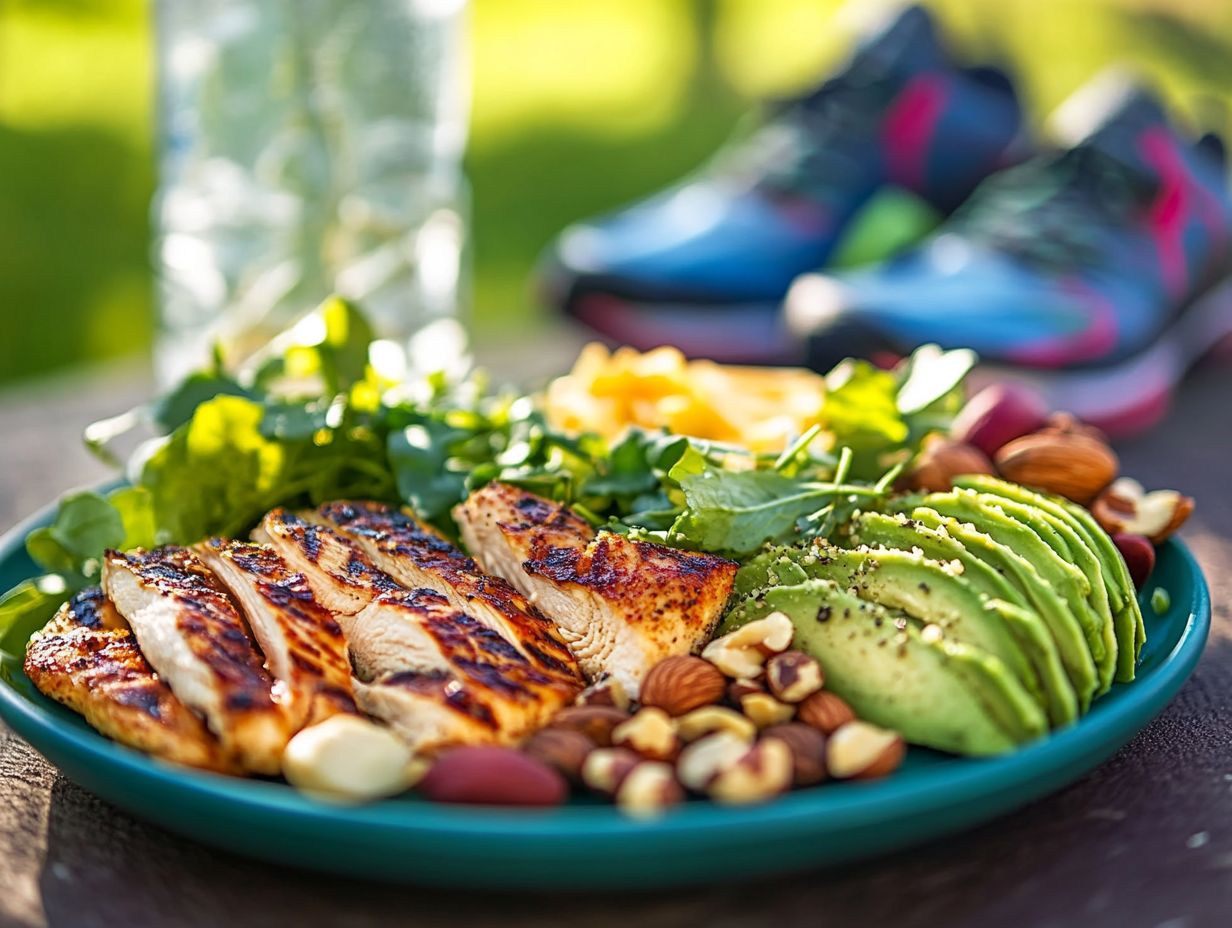
While the ketogenic diet offers numerous advantages for athletes, it’s important to stay alert to potential risks. These include nutrient deficiencies, muscle loss, and the challenge of maintaining ketosis and nutrient intake during a rigorous training regimen.
To truly optimize your diet and achieve peak performance, you must navigate these complexities with precision. This ensures that all your nutritional needs are met without compromise.
1. Potential Nutrient Deficiencies
One of the primary concerns on the keto diet should be the potential for nutrient deficiencies. The restrictive nature of this approach might limit your intake of essential vitamins and minerals necessary for energy levels and weight maintenance like magnesium, potassium, and vitamin D.
Addressing these deficiencies is crucial for maintaining your overall health and optimizing your performance. It’s also important to note that to ensure you meet your daily requirements, you should be mindful of your food choices and consider supplementation.
Incorporating leafy greens, avocados, nuts, and seeds can significantly boost your magnesium levels, which is essential for muscle gain. Meanwhile, potassium-rich foods like spinach and salmon can help replenish what you might be losing. While sunlight exposure is vital for vitamin D, many athletes struggle to get enough of it, making a high-quality supplement a worthwhile consideration.
By tailoring these strategies, you can equip yourself with the necessary nutrients to effectively support your training and recovery efforts.
2. Difficulty Maintaining Ketosis
Some athletes may find it challenging to maintain ketosis. This can lead to potential setbacks in performance and adaptation. Factors like carbohydrate intake, hydration levels, and electrolyte imbalances can all play a role in this struggle, often bringing about those frustrating symptoms commonly referred to as ‘keto flu.’
This discomfort can be particularly disheartening if you’re relying on the ketogenic diet to boost your endurance and recovery. To address these challenges, it’s essential to keep a close eye on your macronutrient ratios. Doing so allows you to ensure your carb intake stays low while you consume the right amounts of fats and proteins.
Proper hydration cannot be overlooked; dehydration amplifies feelings of fatigue and diminishes stamina. Incorporating strategies such as regular electrolyte supplementation can help you balance any deficiencies. This keeps your workouts on course and enables you to truly thrive in ketosis.
3. Potential for Muscle Loss
There s a potential risk of muscle loss on the ketogenic diet if you don t manage your protein intake properly or if your caloric deficit is too extreme, hindering weight loss. It s essential to maintain a balanced diet with sufficient protein and sodium intake and calorie counting to preserve your muscle mass while navigating a low-carbohydrate, high-fat regimen.
As you transition to the keto lifestyle, it s crucial to be mindful of your macros. Ensure you re consuming an optimal amount of high-quality protein sources, such as lean meats, fish, eggs, and dairy products. This approach not only supports muscle preservation but also promotes satiety, helping you avoid the pitfalls of overeating.
Incorporating resistance training into your weekly exercise routine can further enhance muscle retention and bolster your metabolic health and body composition. By carefully balancing your caloric intake and focusing on nutrient-dense foods, you can significantly mitigate the risk of muscle loss and effectively achieve your fitness goals on the ketogenic diet.
What Are Some Tips for Athletes Following the Keto Diet?
For athletes contemplating or currently embracing the keto diet, employing effective strategies can markedly elevate both their experience and success. Consider prioritizing meticulous meal preparation to guarantee a sufficient intake of essential nutrients.
Additionally, keeping a close eye on your electrolyte levels will help you maintain balance and address electrolyte imbalances. Lastly, cultivating consistency and patience throughout the adaptation process is vital for achieving your goals.
1. Plan Meals and Snacks Carefully
Careful planning of your meals and snacks is essential as an athlete on the keto diet. This approach ensures you meet your nutritional needs while adhering to the high-fat, low-carbohydrate guidelines that define this dietary lifestyle. Effective meal preparation not only helps you maintain ketosis, but it also enhances your athletic performance by guaranteeing that you have the fuel you need readily available.
To optimize your energy levels, focus on incorporating a diverse array of healthy fats into your meals think avocados, nuts, and olive oil. Streamlining your meal planning is made easier with a well-organized shopping list that highlights keto-friendly ingredients, significantly reducing the chance of impulse purchases that could derail your efforts.
By preparing your meals in advance, you can relieve stress on training days, allowing you to quickly grab pre-portioned snacks or meals that align with your dietary strategy. Don’t forget to prioritize hydration and electrolyte balance, especially as you approach competitions.
These practical strategies not only support your adherence to the keto diet, but they also foster sustained energy and facilitate recovery, ensuring you perform at your peak and achieve your desired performance outcomes.
2. Monitor Electrolyte Levels
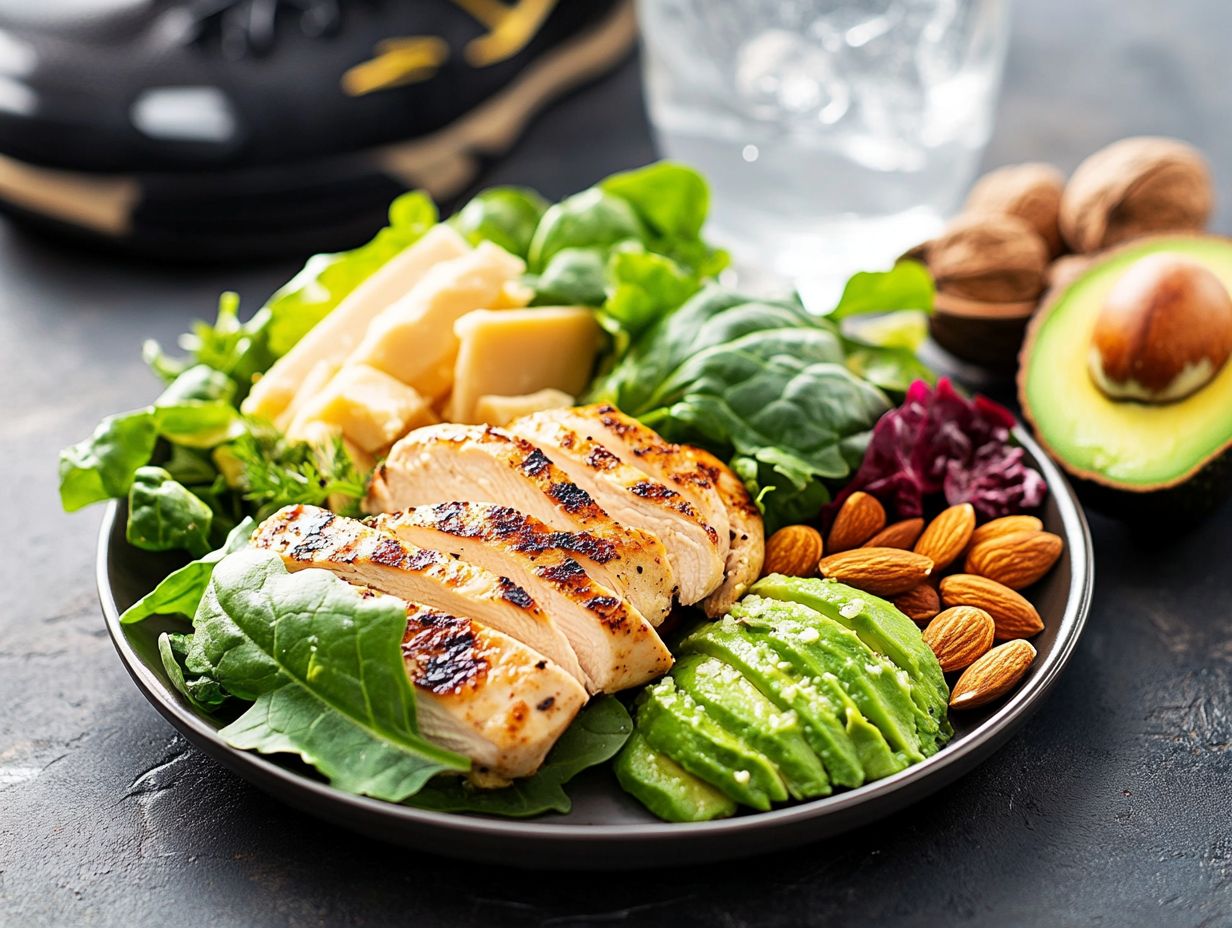
Monitoring your electrolyte levels is crucial as an athlete on the keto diet, especially since imbalances can lead to performance issues and health complications. Maintaining proper hydration and ensuring you re getting enough sodium, potassium, and magnesium is vital for sustained energy, peak power, and effective recovery.
Given that the ketogenic diet can naturally reduce the retention of these essential minerals, it s imperative for you to be vigilant about your nutrient intake. Consider implementing the following strategies for hydration needs:
- Regularly check food labels for electrolyte content.
- Incorporate a variety of electrolyte-rich foods, such as avocados and leafy greens.
- Use supplements when your diet may fall short.
To keep your hydration levels optimized, make it a habit to drink plenty of fluids throughout the day, and don t forget to include electrolyte drinks during intense workouts. Additionally, pay attention to physical signs of imbalance, like muscle cramps and fatigue, as these can provide valuable insights into your overall performance in a demanding training regimen.
3. Stay Consistent and Patient
Staying consistent and patient is crucial for you as an athlete on the keto diet. The transition process can take time and demand a significant amount of willpower and patience to stick to those dietary changes. Embracing this adaptation period is essential for achieving the performance and health outcomes you desire.
You may encounter unique challenges during this transformation. Your body learns to rely on fats for energy instead of carbohydrates. The psychological hurdles can be daunting, but having a supportive community around you can make all the difference.
Sharing your experiences with others on the same journey fosters a sense of belonging and builds accountability. As motivational speaker Zig Ziglar a notable figure in providing coaching advice once said, “You don t have to be great to start, but you have to start to be great!”
Keep in mind that persistence can lead to incredible success stories. Many athletes have triumphed over initial obstacles and are now thriving on their keto journey, enjoying enhanced endurance, mental clarity, and overall health benefits!
Your Keto Questions Answered!
What is the Keto Diet and how does it differ for athletes, including triathletes?
The Keto Diet, also known as the Ketogenic Diet, is a high-fat, low-carbohydrate diet that forces the body to burn fat for energy instead of carbohydrates. For endurance athletes and triathletes, the Keto Diet may require some adjustments to meet their unique nutritional needs for optimal performance.
How does the Keto Diet affect athletic performance and racing strategies?
The Keto Diet can improve athletic performance by promoting weight loss and muscle gain, reducing inflammation, and increasing fat utilization for energy. However, it may also cause a decrease in speed, peak power, and training intensity due to the limited supply of carbohydrates for quick bursts of energy.
What are the recommended macronutrient ratios for athletes following the Keto Diet, especially for those looking to enhance performance?
The recommended balance of fats, proteins, and carbohydrates for athletes on the Keto Diet is 70-80% fat, 15-20% protein, and 5-10% carbohydrates. However, these ratios may vary depending on the individual’s activity level, performance goals, and specific dietary guidelines.
What are some good sources of healthy fats and other essential nutrients for athletes on the Keto Diet?
Healthy fats recommended for athletes on the Keto Diet include avocados, nuts and seeds, olive oil, coconut oil, fatty fish, and grass-fed meats. Incorporating MCT oil can enhance fat oxidation and energy levels. These fats provide essential nutrients and help maintain a healthy balance of macronutrients.
How can athletes ensure they are meeting their nutrient needs and maintaining proper hydration levels on the Keto Diet?
Athletes on the Keto Diet should focus on consuming nutrient-dense foods such as leafy greens, non-starchy vegetables, and high-quality protein sources. They can also consider taking supplements like magnesium, potassium, and vitamin D to ensure adequate intake of vitamins and minerals. Proper hydration is crucial, and athletes should monitor sodium intake to avoid electrolyte imbalances.
Are there any potential risks, drawbacks, or dietary intervention considerations for athletes on the Keto Diet?
Some potential risks of the Keto Diet for athletes include nutrient deficiencies, gastrointestinal distress, and an increased risk of injury due to decreased muscle glycogen stores. Keto flu symptoms and fatigue can affect training intensity and performance efforts. It is important for athletes to consult with a healthcare professional before starting the Keto Diet to ensure it is suitable for their individual needs, especially for those with specific medical conditions.




